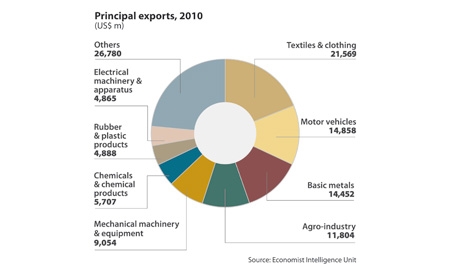As in many other developing countries, the textile and clothing industries have played an important role in the industrialisation of Turkey. Textile sectors are now the driving force in the Turkish export industry, and they have become one of the key players over the years. Thanks to Turkey’s geographical location it enjoys economical relations with countries all over the globe, with the UK being one of its biggest export markets.
It is a country that is truly growing in power, so much so, that last year Turkey’s exports grew by some 12 per cent to reach £71.3 billion ($113.977 billion).
Turkey’s exports broke a record in the pre-global crisis period, rising to £82.7 billion in 2008. Even in 2009, when the crisis was at full impact, Turkey managed to keep exports above £62.7 billion.
The top performers last year include the textile sector, accounting for £13.5 billion in exports. Other driving forces include the automotive sector, with motor vehicle exports totalling £9.3 billion, and the basic metals sector, which registered £9.05 billion.
The workings of any economy can be an intricate affair but Mehmet Zafer Çaglayan, Turkey’s newly appointed Minister of Economy, gives a detailed analysis of his country’s economy.
Prior to his present appointment in 2007, Mr Çaglayan was Minister of Foreign Trade, president of the Ankara Chamber of Industry and vice-president of the Union of Chambers and Commodity Exchanges of Turkey, as well as chairman of Akel Alüminyum A.S. and Çaglayanlar Alüminyum Ltd.
‘IN A RADIUS OF A FOUR-HOUR FLIGHT THERE ARE
56 COUNTRIES PRESENT. IN OTHER WORDS,
WE ARE AT THE CENTRE OF THE WORLD’ |
“When I was first appointed as Foreign Trade Minister, I gathered my staff in a meeting and tried to explain my work philosophy,” says Mr Çaglayan. “My instructions to them were to have two goals: first, to sell Turkish goods abroad; second, to attract investors to Turkey.
“Our first priority should be to attract prominent investors and the biggest possible investments to Turkey. I have certain advantages because I come from within the industry, and therefore, I am well versed in the problems that exporters, investors and businessmen encounter every day.”
Attracting new investors is always a goal for emerging economies and presently Turkey enjoys warm political, economic and cultural relations with the UK that go back 500 years. In fact the UK has made it clear that it intends to double its investments in Turkey in the next five years. Today there are more than 2,200 British companies operating in Turkey which Mr Çaglayan says is of huge importance to his country.
“The UK constitutes a very important, if not the most important, partner in the EU and in the world for Turkey. We have very important cooperation between us and we have a committee responsible for economic and commercial collaboration,” says Mr Çaglayan.
“The UK is a very important player in world; it is a country that reached more than £501.5 billion in foreign trade in 2009. The GDP of the UK and its income per capita is obviously very strong. And finally, the UK is the only country we have a surplus of foreign trade with.”
Mr Çaglayan hopes that during his reign as minister he can keep attracting foreign investment and make Turkey into a global player to be reckoned with.
“In a radius of a four-hour flight there are 56 countries present. In other words, we are at the centre of the world,” he says.
“Turkey is a very important developing country and others should take advantage of it, considering that the share on the part of the developed countries is shrinking by the day, and the share of the developing world is increasing.
“We are surrounded by seas on three sides and this gives us huge logistical advantages. We have 46 airports and we have more than 20,000 kilometres (12,427 miles) of developed roads. If we take into account the accelerated train project and our railway network, the travelling distances are diminished considerably.”
According to the Minister, in the coming years the government will be rehabilitating more than 620 miles of railway network and its assets include the greatest fleet of land transporters in the EU.
“Last but not least, I will refer to our young and dynamic population. Turkey has 150 universities that graduate more than 500,000 students every year. We have a very good and industrious workforce. Finally, this is a country that provides very good incentives for investment and for research and development,” concludes Mr Çaglayan.

0 COMMENTS